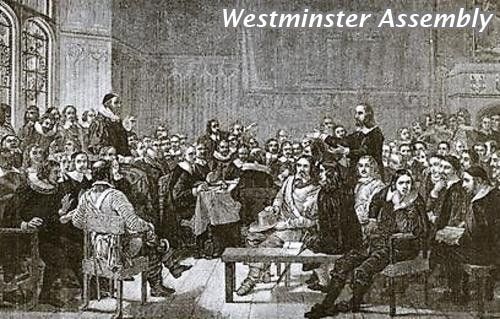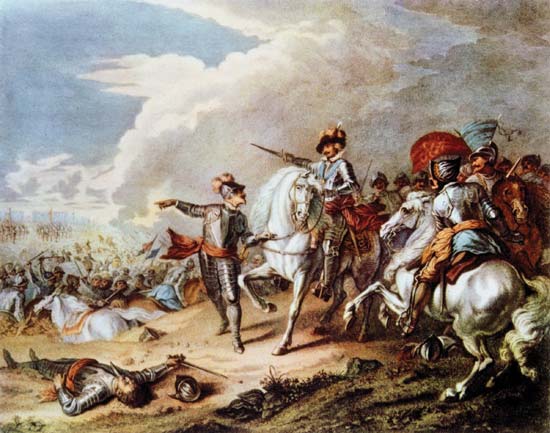
In the previous article we saw how the Westminster Assembly came to be set up in 1641 and how the Puritan movement was based in no small part on eschatological foundations. The hope and expectation of Presbyterian and Independent leaders alike was that episcopacy would be banished from the church and the biblical millennium would then dawn. However, tensions soon became apparent within the Assembly.
The Scots’ defence of Presbyterianism distanced them from the English Independents, who were their most natural allies in terms of their views on eschatology (their doctrine of the ‘last days’). In December 1643, Baillie recorded the Scots’ decision to eschew a public rupture with the Independents, ’till we were more able for them’. Nevertheless, two months later, the Independent dissenting brethren’ had published their Apologetical Narration in what Baillie described as a most sly and cunning way’. This publication took the Scots by surprise and contributed to the dislocation of the brotherhood. On 4 March Rutherford reflected that ‘There is nothing here but divisions in the Church and Assembly’. The Scots were beginning to recognise the fragility of their relationship with the English saints.
Confrontation
As the summer of 1644 approached, the unity of the Puritan brotherhood ‘and the entire success of the Puritan enterprise’ hung in the balance. At the end of May, Rutherford (who had lost two children during his participation in the work of the Assembly) was growing disconsolate about the possibility of success: ‘for my part, I often despair of the reformation of this land, which saw never anything but the high places of their fathers and the remnants of Babylon’s pollutions’.
Elements on both sides determined to force a confrontation. In February the Five Dissenting Brethren ‘the leaders of the Independent faction at the Assembly’ had explicitly denied that it ‘could ever enter into our hearts to judge’ Presbyterianism as antichristian. But others had no such scruples.

Baillie records allegations that the Westminster Assembly was an Antichristian meeting, which did erect a Presbytery worse than Bishops’. Others calculated that the Solemn League and Covenant numbered 666 words, the number of the beast in Revelation 13:18! Some were more reasonable. In June, in a conciliatory introduction to John Cotton’s The Keys of the Kingdom of Heaven (1644), a seminal defence of the New England Independency, Thomas Goodwin and Philip Nye lamented the sharpest contentions’ of the times.
Nevertheless, both sides seemed entrenched in their opposing under-standings of true church order, and consolidated their diverse ecclesiologies with robustly millenarian hope.
New champion
Soon others joined the debate. Following books like John Smyth’s The Character of the Beast (1609), Baptists attacked the Presbyterians and Independents alike. For example, in 1644 Christopher Blackwood wrote The Storming of Antichrist in his two last and strongest Garrisons, Of Compulsion of Conscience and Infants Baptism.
Some argued against the theological basis of all the above groups, claiming Calvinists in general were that great Antichrist … who deny the general redemption of … the whole creation’. John Milton described the demands of the Puritan theocracy of the early 1640s as worse than those of [the Council of] Trent’, before coining his famous motto, ‘New Presbyter is but old Priest writ large’.

John Coffey has argued that by 1647 it seemed to Rutherford that all his work to establish Presbyterian government in England seemed in danger of collapse’. The radical parties, formerly represented by mainstream Independents like Goodwin and Nye, had found a new champion in Oliver Cromwell, who was rising in power after a string of military victories. Theological competence was becoming less important than the influence of military might, as England drifted further and further into civil war. The Puritan brethren finally polarised into competing factions.
Errors of the times
For some, these very divisions were a sign of the times. Archibald Johnston, the millenarian Scottish Commissioner, advised the Westminster divines that ‘Until KING JESUS be set doun on his throne, with his sceptre in his hand, I do not expect God’s peace, and so no solid peace from men in those kingdoms; but that sovereign truth being established, a durable peace will be found to follow thereupon’.
The Independent leaders expressed their disappointment at the eventual failure of the Puritan theocracy by moving, for a short while, toward more extreme positions. Thomas Goodwin lurched from the relative conservatism of his premillennial commentary on Revelation (1639) to become something of a hero among the most radical eschatological group, the Fifth Monarchists, who believed that the indestructible kingdom of Daniel 2:44 was about to be established.
Baillie continued to berate the Independents in his A Dissuasive from the Errors of the Times (1645). Forgetting their earlier alliance, Baillie condemned the Independents’ hope that their system of church government is a beginning, or at least a near antecedent of Christ’s Kingdom upon Earth. That within five years Christ is to come in the flesh; and by a Sword of Iron, to kill with his own hand the most of his enemies; and therefore to pass over a thousand years as a worldly Monarch with his Saints: Who shall live with him all that time in all sorts of fleshly delights’. Where the Scottish conservatives and the English radicals had earlier found common ground, they now allowed no more than hostile suspicion.
Political Puritans
Thus, in spring 1644, the Puritan movement split between post-millennialists, who favoured Presbytery, and pre-millennialists, who preferred the Independent order. Reflecting their bias toward middle-class support, the Presbyterians stepped back from the brink of the millennium to work for a national church counting both elect and reprobate among its members.

The Independents, reflecting the socio-political interests of those who had least to lose, pressed ahead in their determination to allow only the saints the privileges of the new age. The historian William Haller has noted that before 1644, the independents and the separatists of all sorts remained relatively obscure and seemed unimportant. After that date, they suddenly came forward to oppose the majority in the Assembly, disrupt its plans, multiply sermons and pamphlets beyond number, fill Cromwell’s army, push forward a revolution far more sweeping than any which the original Puritan reformers had conceived, and eventually to give the term Puritan the meaning it has to a large extent since retained’.
Lost opportunity
In 1644, therefore, eschatology evolved from being the foundation of Puritan unity to become the rock on which it foundered. The Westminster Assembly was a watershed in Puritan experience. Never before had biblical Christianity been offered such influence, and never before had eschatological interests undermined an enterprise of such importance.
Having been given the responsibility of outlining a new confession of faith to unite the saints throughout the islands, the Westminster delegates squandered the opportunity, refusing to work with men whom they ought to have loved in the gospel, towering giants of the calibre of Ussher.
A unique opportunity was sacrificed to eschatological squabbling a luxury they did not realise they could not afford. Within twenty years, with the Restoration of Charles II in 1660, the churches were again subject to tyranny and fear.
Issues of the hour
Today, as God calls his people back to his Word, to rebuild the broken ruins of our Jerusalem, we do not know whether the opportunities we have, however small, will ever be repeated. It would be folly if we failed to learn from the mistakes of our fathers, and aligned ourselves again on the bases of competing eschatologies.
Of course, an understanding of such things as church order and God’s future purposes are important, as we seek to be obedient to Scripture and God’s will. But are these really the issues of the hour? Should not our energies be devoted to preaching the gospel of the glory of Christ, and salvation through his grace and faith in him?
As our world slips further into darkness, let us lift up our heads together. Whether they are pre-, post- or a-millennialists, the common redemption of all God’s people draws nigh.





